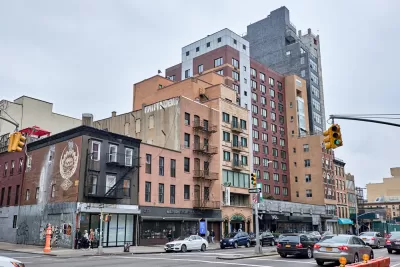A new paper published by the Joint Center for Housing Studies of Harvard University raises the stakes of the discussion about exclusionary zoning and its role in the ongoing housing affordability crisis in the United States.

Michael Stegman explains new writing on the subject of exclusionary zoning that makes an argument for overturning the dominant practice of 20th century zoning as the civil rights issue of the current era.
Stegman notes that he recent formation of the White House Council on Eliminating Regulatory Barriers to Affordable Housing is only the most recent version of a recurring series of political efforts at the federal level, consistent despite political party in recent adminsitrations:
Though their respective contexts may vary according to the political economy of the time, their centers of gravity are strikingly similar. Each is based on the proposition that unnecessary and exclusionary land use regulations drive up production costs and drive down housing supply, worsening an already severe affordability crisis…
Stegman also notes that previous efforts to reform exclusionary zoning have resulted in more talk than action. Stegman's new "Industry Perspectives" paper argues that the reason for the failure to reform local zoning practices is caused by underestimating the national implications of status quo.
The paper, titled "Eliminating Exclusionary Land Use Regulations Should Be the Civil Rights Issue of Our Time," therefore cites "several recent state and local zoning reforms that have the potential to make significant local impacts." Still, those local efforts reflect only a patchwork, and "focusing exclusively on isolated local reforms fails to recognize that the collective impact of decades of layering exclusionary zoning and land use controls is not just higher housing prices."
Instead of these local reforms, Stregman suggests the federal government should treat exclusionary zoning like a national problem, even suggesting constitutional means.
FULL STORY: ELIMINATING EXCLUSIONARY LAND USE REGULATIONS SHOULD BE THE CIVIL RIGHTS ISSUE OF OUR TIME

Alabama: Trump Terminates Settlements for Black Communities Harmed By Raw Sewage
Trump deemed the landmark civil rights agreement “illegal DEI and environmental justice policy.”

Planetizen Federal Action Tracker
A weekly monitor of how Trump’s orders and actions are impacting planners and planning in America.

Why Should We Subsidize Public Transportation?
Many public transit agencies face financial stress due to rising costs, declining fare revenue, and declining subsidies. Transit advocates must provide a strong business case for increasing public transit funding.

Understanding Road Diets
An explainer from Momentum highlights the advantages of reducing vehicle lanes in favor of more bike, transit, and pedestrian infrastructure.

New California Law Regulates Warehouse Pollution
A new law tightens building and emissions regulations for large distribution warehouses to mitigate air pollution and traffic in surrounding communities.

Phoenix Announces Opening Date for Light Rail Extension
The South Central extension will connect South Phoenix to downtown and other major hubs starting on June 7.
Urban Design for Planners 1: Software Tools
This six-course series explores essential urban design concepts using open source software and equips planners with the tools they need to participate fully in the urban design process.
Planning for Universal Design
Learn the tools for implementing Universal Design in planning regulations.
Caltrans
Smith Gee Studio
Institute for Housing and Urban Development Studies (IHS)
City of Grandview
Harvard GSD Executive Education
Toledo-Lucas County Plan Commissions
Salt Lake City
NYU Wagner Graduate School of Public Service





























